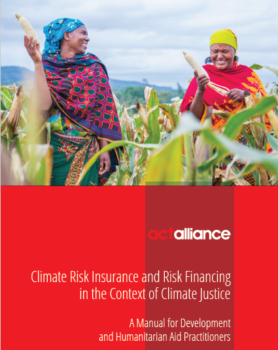 ACT Alliance’s latest publication: Climate Risk Insurance and Risk Financing in the Context of Climate Justice: A Manual for Development and Humanitarian Aid Practitioners is now available for download.
ACT Alliance’s latest publication: Climate Risk Insurance and Risk Financing in the Context of Climate Justice: A Manual for Development and Humanitarian Aid Practitioners is now available for download.
Climate risks provoke havoc, lead to humanitarian catastrophes, and stand in the way of achieving the Sustainable Development Goals (SDGs), thus, it is critical to prevent and minimize risks as much as possible. However, even in doing so, there remain residual risks that cannot be avoided. This is where risk insurance and risk financing have an important role to play.
Climate risk transfer, that is, risk insurance, and risk financing are tools to financially address residual loss and damage by providing financial compensation.
This manual aims to help ACT Alliance and its members enhance their knowledge and understanding of climate risk insurance and risk financing approaches and instruments.
Specifically it:
- Explores the full range of climate risk transfer approaches, with many case examples and visualizations.
- Introduces a set of climate justice-based criteria, helping readers to assess the advantages and limitations of various risk transfer approaches.
- Provides an overview of the different types of climate risks and identifies risk transfer instruments that are best suited for each type of climate risk.
The Manual is available for download in English and Spanish.
This Manual is a product of ACT Alliance Global Climate Change Project implemented with the support of ACT member Brot für die Welt.